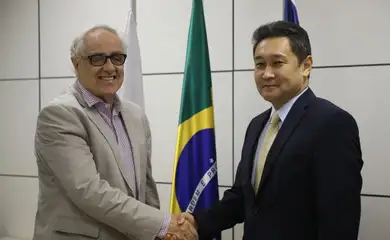Brazil foreign minister talks partnerships with Kazakhstan
Brazil’s Foreign Minister Aloysio Nunes Ferreira Thursday (Nov. 1) attended a number of work meetings in Astana, capital of Kazakhstan, to discuss topics of common interest on the bilateral, multilateral, and regional agendas as well as potential cooperation initiatives between the two countries, especially in energy and agriculture.

This was the first time a Brazilian chancellor goes on an official trip to Kazakhstan, and the visit takes place when the two countries celebrate the 25th anniversary of their diplomatic relations.
In Astana, Aloysio Nunes held work meetings with Kazakh Minister of Foreign Affairs Kairat Abdrakhmanov and deputy Prime Minister and Agriculture Minister Shukeyev Umirzak. Topics discussed were technical cooperation and facilitated investment.
New stage
The visit of the Brazilian chancellor marks a new stage in the strengthening of the friendship and cooperation between Kazakhstan and Brazil, whose ties were significantly bolstered after the high-level visits paid in 2007 and 2009. In September 2016, Kazakh President Nursultan Nazarbayev met with Brazil’s Michel Temer, while the G20 summit meeting was being held in China.
To ensure the development of economic ties between the two countries—since Brazil is among Kazakhstan’s top trade partners in Latin America—great emphasis was placed on business-to-business meetings and forums with representatives from Kazakhstan and Brazilian business communities.
Bilateral trade
In the first six months this year, Brazil–Kazakhstan trade reached over $45 million, with a balance of trade favorable for Kazakhstan—$36.13 million.
Chief among the products exported by Brazil to Kazakhstan during the period were sugar cane (46 percent), manufactured goods (mechanic devices, tires, and medication), and pork. Sales added up to $4.76 million.
Brazil, on the other hand, imported sulfur (61 percent), radioactive elements, ferroalloys, and silver. Imports totaled $40.89 million.
In today’s meetings, Kazakh authorities expressed their interest in deepening multilateral dialog with Brazil, which plays an important role in international and regional mechanisms, like Brics, G20, and Mercosur. It was evident that developing cooperation between the Eurasian Economic Union and Mercosur could make a positive impact on the economic dynamics between the two countries.
Both sides agreed to continue talks on global security with the UN, with a focus on the non-proliferation of nuclear weapons and the fight against international terrorism.




